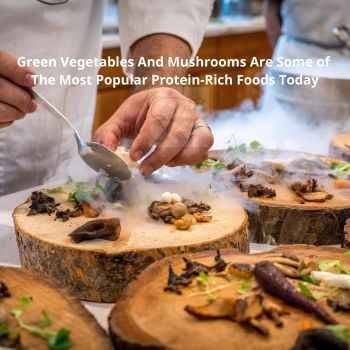Best High Protein Foods are found in many foods such as meat, fish, eggs, milk, soybeans, and whole grains as a source of high protein.
High-protein foods are essential nutrients needed by the body that humans need. Their role as fuel in the building blocks of body tissue and can also serve as a fuel source is the most important defining feature for tissue repair that helps fight disease.
A high-protein diet is one in which 20% or more of total daily calories come from protein; foods in a high-protein diet include lean beef, chicken, pork, salmon and tuna or poultry, eggs, and soybeans. Many high-protein diets are high in saturated fat and limit carbohydrate intake. For example, a high-protein diet is often used by people who are losing weight and working out at the gym to lose fat and build muscle. High-protein diets such as the Atkins and Protein Power diets.
Protein foods not only help build and repair tissues but also support the immune system and maintain overall health.
High complete protein from animals such as meat, poultry, fish, eggs, and dairy products. They contain all the essential amino acids in sufficient quantities, about 20 amino acids which the body needs for different functions.
Best high-protein foods, especially animal products, are rich in omega-3 fatty acids which are essential for brain health, reduce inflammation, and support heart health. Vitamins such as B6, B12, niacin, riboflavin, and folate can help with energy metabolism, red blood cell formation, and normal functioning of the nervous system.
Iron is commonly found in red meat and poultry, which are rich sources of heme iron, which is absorbed by the body to produce hemoglobin, a component of red blood cells that transports oxygen. Plant-based zinc contains an essential mineral in immune function, wound healing, and DNA synthesis.
Calcium is found in high-protein dairy products, which is important for bone health, blood clotting, and muscle function. Magnesium comes from plants like nuts and legumes which help control blood sugar and bone health, magnesium is important for muscle and nerve function,
In addition to meat products, milk, and nuts are good sources of phosphorus, an important mineral for bone and tooth formation, kidney function, and energy metabolism. A balanced diet that includes a variety of protein sources from both animal and plant sources can contribute to meeting the body’s nutritional needs.
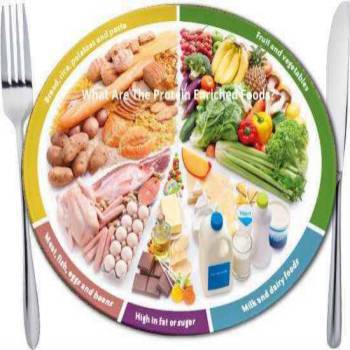
What Is The Function of High Protein Foods?
Protein foods play an important role in the overall functioning of the body and ensure human health. Proteins include all amino acids, which are essential for various physiological processes. You can refer below to some important functions of protein foods:
Muscle maintenance and growth: Lean protein foods are the basic foundation for building muscle. If you consume adequate amounts of protein, it will help support faster muscle maintenance and recovery, especially during times of sports activity, exercise, or when you need to recover from an injury.
Enzyme production: Many enzymes are mainly responsible for promoting the catalysis of biochemical reactions in the body, none other than proteins. They are essential substances for digestion, metabolism, and other important activities.
Hormone synthesis: Some hormones, such as insulin and growth hormone, are proteins. High protein is essential for the synthesis and regulation of these hormones, which make important contributions to growth, metabolism, and overall health.
Immune system support: Protein foods are essential for the body to produce antibodies, it is an important and indispensable component of the immune system. A well-functioning immune system requires adequate and high protein, which can help protect the body against infection and disease.
Tissue repair and wound healing: It is especially important during times of injury, surgery, or illness. Protein is important for tissue repair and regeneration, as the body needs supplementation to support the healing process.
Transport of nutrients: There are some proteins such as hemoglobin in red blood cells, which help transport oxygen to different tissues and organs of the body, the rest facilitate the transport of nutrients, ions, and molecules across cell membranes.
Maintains pH and Fluid Balance: They help the body maintain the pH balance of its fluids and make an important contribution to fluid balance by regulating the movement of water between cells and vessels. blood.
Energy source: While carbohydrates and fats are the main sources of energy, high protein can be used to produce energy when needed. However, the main role of proteins is not to store energy; they are more important for their structural and functional roles in the body.
To ensure your body’s health functions properly, it’s important to add a variety of high-quality protein sources to your diet or search the protein foods list, such as lean meat, poultry, fish, eggs, dairy products, legumes, nuts and seeds. The amount of protein needed varies based on factors such as age, activity level, and overall health, but maintaining adequate protein intake is essential for overall health.
What Are The Best High Protein Foods?
There are many protein-rich foods that you can include in a balanced diet. Protein is essential for various body functions, it can build muscle, repair, and help support the immune system. Worldwide, plant protein foods contribute more than 60% of per capita protein supply, with foods of animal origin contributing about 70%.
Rich sources of plant protein include beans, nuts, seeds, grains, and some vegetables and fruits. Plant foods with high protein content are frequently used by people on a vegan diet because they are healthy and do not cause obesity. Recommended by the American Board of Nutrition.
Rich sources of animal protein such as beef, pork, chicken, fish… Increasing animal protein consumption has been shown to increase muscle mass, which helps improve muscle adaptation. with resistance training and reduce muscle loss when you are deficient in energy and nutrients.
Be sure to consider the overall nutritional composition of foods and consult with a health care professional or nutritionist for a diet that balances protein with other essential nutrients, based on your personal health and fitness goals.
Best High Protein Foods List: 16 Foods for High Protein Meals
-
Super high protein foods: Lean cuts of grass-fed beef are rich in protein, iron, and zinc…
-
Healthy high-protein foods: These are high in protein and also provide healthy fats…
-
High fiber high protein foods: Lentils are beans that are high in protein fiber and other essential nutrients…
-
Best high-protein foods for weight gain: Pork can be a good source of protein, especially lean cuts like pork tenderloin…
-
Best high-protein foods for muscle building: Lean and versatile, chicken breast is an excellent source of high-quality protein…
-
Low-fat high-protein foods: Cottage cheese is a dairy product that is high in protein and low in fat…
-
Low-calorie high protein foods: Another great bean, chickpeas are versatile and can be used in a variety of dishes…
-
Low sodium high protein foods: Similar to chicken, turkey is a lean protein option…
-
Best high-protein foods for picky eaters: Cow’s milk is a source of protein, calcium, and vitamin D…
-
Best high protein foods for pregnancy: Fatty fish like salmon provide omega-3 fatty acids along with protein…
-
Best high protein foods and snacks: Edamame is young, green soybeans that are high in protein and make a great snack…
-
Best high-protein foods for weight loss: Quinoa is a complete protein and contains all nine essential amino acids…
-
Non-meat high protein foods: Eggs are a complete source of protein and contain essential amino acids...
-
Soft high protein foods: Higher in protein than regular yogurt, Greek yogurt is also rich in probiotics…
-
High-protein meats: lamb is indeed a good source of high-quality protein. It is rich in essential amino acids, which are the building blocks of proteins that the body needs…
-
Cheap high-protein foods: Green vegetables and mushrooms are some of the most popular protein-rich foods today…
The best high-protein foods are essential for overall health. Including adequate amounts of protein-rich foods in your diet helps with growth and health maintenance. Below are 16 great sources of protein recommended by nutrition experts, for you to consider including in a healthy diet:
The 16 Best High-Protein Foods Reviews
Best high protein foods provide essential nutrients for the human body. There are essential amino acids that humans must obtain from their diet to prevent protein-energy malnutrition and death according to the American Dietetic Association (AND – Academy of Nutrition and Dietetics).
1. Lean Cuts of Grass-Fed Beef Are Rich in Protein, Iron, and Zinc
Super high–protein foods
Grass-fed beef is often considered a healthy meal, making it a healthier choice for high-protein meals, compared to beef raised on conventional grain-fed farms. The lean cuts of grass-fed beef offer many nutritional benefits.
Grass-fed beef is called Super high protein foods by nutritionists, it is essential for building muscles and repairing tissues. In addition, it also supports the immune system to maintain your overall health, giving you high-protein meal prep ideas.
Grass-fed beef is one of the richest sources of heme iron, much more than the iron found in other animal products. Iron makes an important contribution to oxygen transport in the blood and supports energy metabolism.
Grass-fed beef is also rich in zinc, a mineral that helps with wound healing and DNA synthesis, which plays an important role in immune function.
Additionally, grass-fed beef is the best high-protein food, for high-protein low-fat meals. Because, it is higher in certain nutrients, including omega-3 fatty acids and antioxidants like vitamins A and E, boost high protein, than beef raised on grain-fed farms. These nutritional differences are due to the natural diet of grass-fed cattle, which includes a variety of grasses and other plants.
High protein foods diet. It’s important to note that when choosing lean meat, nutritionists often recommend further reducing overall fat content. Although grass-fed beef tends to be leaner than grain-fed beef, it may still contain some saturated fat. As with any high-protein meats, moderation is important for people to maintain a balanced diet that includes a variety of nutrient-dense foods and high protein low carb recipes.
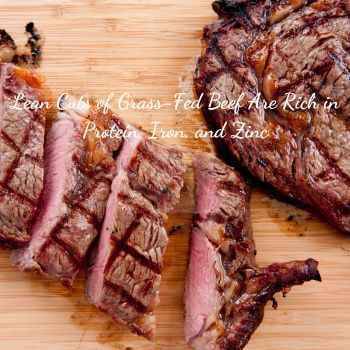
2. Tofu: These Are High in Protein And Also Provide Healthy Fats
Healthy high-protein foods
Tofu is a great plant-based protein food and it contains healthy fats. It is made from soybeans and is one of the popular ingredients for people on a high-protein vegan diet. Here’s one of the reasons why tofu is considered a high-protein food that’s low in fat and provides healthy fats.
Tofu is a rich source of protein. It contains nutrients including all the essential amino acids, making it a complete protein source and a nutritious high-protein snack. A valuable supplement to vegetarian or vegan diets. This protein-rich food can vary depending on the firmness of the tofu, but overall, it provides a significantly high protein per serving.
Although tofu is not particularly high in fat, according to the American Academy of Nutrition and Dietetics, it contains healthy fat: it is considered very good for health. overall health. In addition, it is also considered a strong source of good unsaturated fats, including polyunsaturated and monounsaturated fats. These are heart-healthy fats and can contribute to overall health.
In particular, tofu is made with ensure high protein flaxseed oil, which is an omega-3 supplement made from algae that contains small amounts of omega-3 fatty acids. Essential fats are beneficial for heart health, brain function, and inflammation control.
Tofu is also considered a source of other essential nutrients such as iron, calcium, magnesium, and zinc. These minerals are important for various bodily functions, including bone health and immune system support.
To make the most of the nutritional benefits of tofu. The American Society for Nutrition (ASN) recommends that people add many different protein sources to their healthy protein meals and combine tofu with many vegetables and grains. whole grains or other nutrient-rich foods.
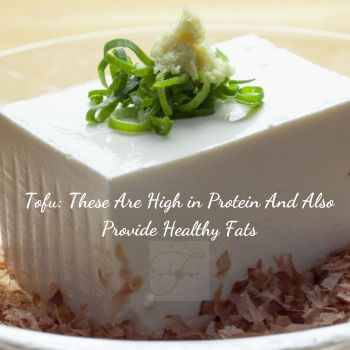
3. Lentils Are Beans That Are High-Protein Fiber and Other Essential Nutrients
High fiber high protein foods
People say lentils do not belong to the legume family, but they are still grouped with beans. Lentils are truly a complete protein food, high protein, fiber, and many similar essential nutrients and culinary uses.
Lentils are an excellent source of plant-based protein, along with essential amino acids, making them a valuable nutritional source and high-protein food for vegetarians and vegans.
Lentils are high in fiber, which benefits digestive health and helps regulate blood sugar, making lentils a satisfying fiber and protein food choice.
Lentils are a rich source of plant-based protein, providing micronutrients, and are rich in vitamins and minerals, including folate, iron, phosphorus, potassium, and manganese. Low in fat, especially saturated fat, makes lentils a top choice for heart-healthy foods.
Lentils are naturally high in protein, provide complex carbohydrates, and are a healthy source of sustainable energy. Lentils contain antioxidants, such as polyphenols, that provide many other health benefits. each other, including reducing inflammation.
Adding high-protein foods to your diet can contribute to a balanced and nutritious meal. Versatile in a variety of recipes, such as soups, stews, salads, and curries. Making them a convenient choice for many recipes.
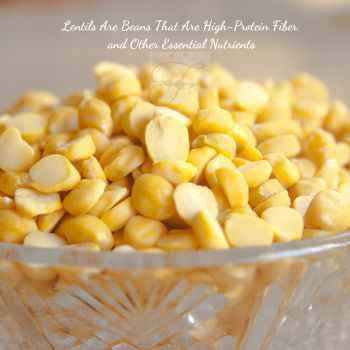
4. Pork Can Be A Good source of Protein, Especially Lean Cuts Like Pork Tenderloin
Best high–protein foods for weight gain
Pork with lean cuts such as pork tenderloin is especially nutritious, a good source of protein and essential nutrients such as vitamins and minerals, and relatively low in fat, especially saturated fat.
Pork tenderloin is a source of high protein, essential for the growth, repair, maintenance, and growth of tissues in the body, and high-protein foods for muscle building.
Pork contains many different vitamins such as B vitamins such as B6, B12, niacin, riboflavin, and thiamine. These vitamins play an important role in energy metabolism and overall health.
Important minerals found in pork include iron, zinc, phosphorus, and selenium. they are needed to transport oxygen in the blood, support immune function, and heal wounds.
Lower in fat than other types of pork, because they are relatively lean, they are the top choice for gym goers who want to control their fat intake and use them for muscle-building high protein foods.
However, when choosing a recipe to supplement these high-protein foods well, you should consult a nutritionist for further advice and cook the pork thoroughly to the recommended internal temperature. This will help eliminate any potentially harmful bacteria, and ensuring food safety is essential.
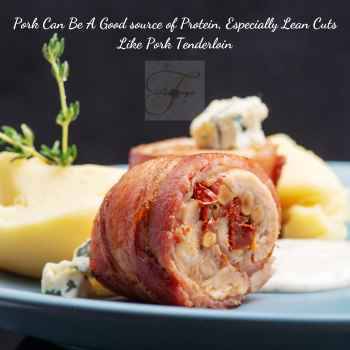
5. Chicken Breast Is An Excellent Source of High-Quality Protein
Best high–protein foods for muscle building
Nutritionists consider chicken breast to provide high-quality protein, it is a lean source of protein and its versatility is good for muscle growth. Chicken breast is a lean meat that is low in fat, especially saturated fat, making it a top choice on the list of healthy high-protein foods that want to increase their protein intake while keeping their fat content relatively low.
It is a lean protein that effectively supports muscle development, recovery, and overall growth. Its versatility allows you to use it in a variety of cooking methods, making it a choice among athletes and a staple in many high-protein foods diets.
Low fat low carb high protein foods, The protein in chicken breast is rich in essential amino acids. In addition, it also provides nutrients such as vitamins B6 and B3, phosphorus, and selenium, which are important substances that contribute to overall health, building and repairing what your body needs to function. different.
In addition, lean protein sources such as high-fat protein foods can benefit health development, muscle maintenance, and overall nutrition. However, balance your high protein intake with a variety of other foods to ensure you are getting the full combination of nutrients.
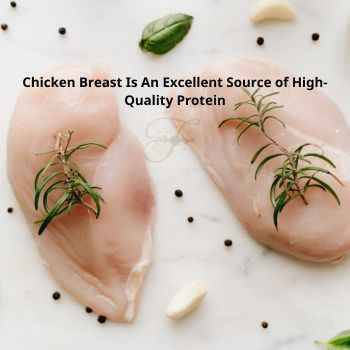
6. Cottage Cheese Is A Dairy Product That Is High In Protein and Low In Fat
Low-fat high-protein foods
Cottage cheese is a popular dairy product that is high in protein and contains a higher percentage of milk fat, giving it a creamier texture and richer flavor. Cottage cheese contributes to a reduced carbohydrate content compared to some other dairy products.
Cottage cheese is high in protein and exceptional making it a preferred choice for those looking to increase their protein intake. The exact nutritional content may vary depending on the brand and type of cheese, but overall, it is a good source of protein.
In addition, it is a source of essential nutrients such as calcium, phosphorus, selenium, and B vitamins. Protein is essential for various body functions, including muscle repair and maintenance, supports the immune system, and produces enzymes and hormones
Cottage cheese is a versatile ingredient and can be used with many ingredients in many different ways. It can be eaten alone or mixed with fruits, vegetables, or other ingredients to create a salad, high-protein snack, or Breakfast. It is also used in high-protein meal recipes such as smoothies, dips and spreads, Pasta Dishes, baking, sauces, and dressings.
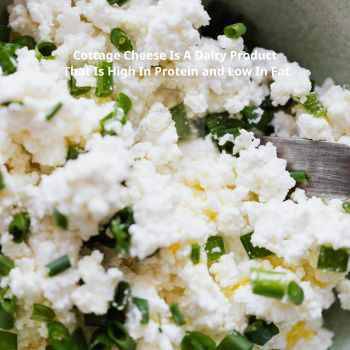
7. Chickpeas Are Rich In Protein And Can Be Used In A Variety of Dishes
Low-calorie high protein foods
Chickpeas are a popular vegetable although they are not particularly high in protein compared to the foods above. But they can be a nutritious addition to many different dishes
The protein content of green beans is not very high but they help contribute to your overall protein intake. Especially when you know how to combine it with other protein sources.
It is a high-protein, low-calorie food. Green beans are very low in calories and fat, making them a good choice for people who want to maintain a balanced diet. They are a good source of vitamins such as vitamin C, vitamin K, and folate, and minerals such as potassium and manganese.
Green beans are a high-fiber food rich in protein and fiber that are beneficial for digestive health. It helps regulate bowel movements, creates a feeling of fullness, and supports your overall gut health.
Green beans are high in antioxidants that help protect your cells from damage caused by free radicals. Antioxidants contribute greatly to the body’s health and play a role in reducing the risk of chronic diseases
Green beans can be used in a variety of dishes, including stir-fries, salads, stews, and side dishes. Their mild flavor allows them to complement a variety of other ingredients.
Green beans are a valuable vegetable to include in a varied and complete diet. Their mild flavor allows them to complement a variety of other ingredients. Green beans can be used in a variety of dishes, including stir-fries, salads, stews, and side dishes. Combining them with other protein-rich foods, such as meat, beans, or nuts, can create a balanced and nutritious meal.
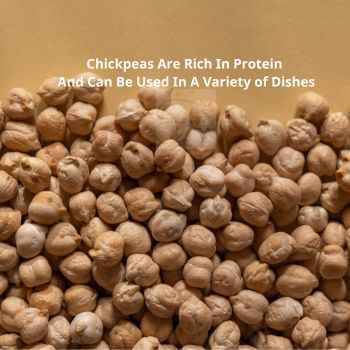
8. Similar To Chicken, Turkey Is a Lean Protein Option
Low sodium high protein foods
Turkey meat is the choice to provide lean protein similar to chicken. Both types of poultry are good sources of high-protein foods, which are essential for muscle maintenance, repair, and overall body function. Turkey is relatively low in fat, especially if you choose lean cuts of meat and remove the skin.
Especially skinless turkey breast, which is a high protein low fat food. It is a good choice for those who want to lose weight or do not need to tolerate extra fat.
Turkey breast is considered a rich source of protein, it contains essential amino acids important for various body health functions, including building and repairing tissues.
In addition to being high in protein, turkey meat also provides nutrients such as vitamins B6 and B12, niacin, phosphorus, and selenium. Plus, it’s a versatile high-protein option. Turkey meat can be roasted, grilled, broiled, or used in soups, salads, and sandwiches.
What you need to keep in mind is that turkey and chicken have similar nutritional profiles but may have some differences depending on the specific cut and cooking method. As with any healthy food, consuming a moderate and balanced diet is key to achieving optimal nutrition.
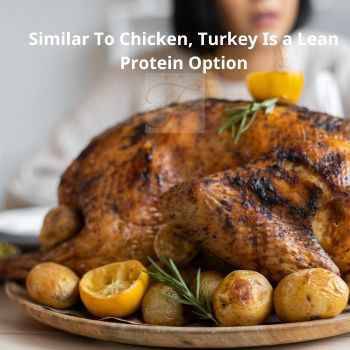
9. Cow’s Milk Is A source of High Protein, Calcium, and Vitamin D
Best high-protein foods for picky eaters
Cow’s milk is chosen by many families because it is a good source of many different nutrients such as high-quality protein, calcium, and vitamin D.
Cow’s milk provides a complete protein source for a high-protein diet. Cow’s milk contains all the essential amino acids that the body cannot produce on its own. High protein is important for the growth, repair, and maintenance of tissues in your body.
Cow’s milk products are rich in calcium, which is needed to build and maintain strong bones and teeth. Calcium is also involved in various physiological processes, such as blood clotting and muscle function.
Foods with high protein, often supplemented with vitamin D help with calcium absorption and bone health. Vitamin D is equally important for immune function and overall health. Therefore, when you are exposed directly to sunlight, it will trigger the synthesis of vitamin D in the skin.
Cow’s milk can be a nutritious choice for high-protein fast food, but you need to keep in mind that your body may be lactose intolerant or allergic to milk proteins. In these cases, alternative sources of nutrition may be needed from plant-based milk substitutes such as soy milk, almond milk, and oat milk which are becoming popular choices for people with disabilities. lactose intolerance or follow high-protein vegetarian meals. These high-protein meal alternatives are often fortified to provide nutrients.
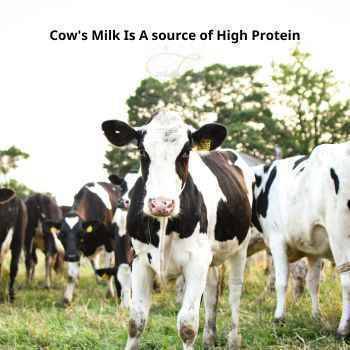
10. Fatty Fish Like Salmon Provide Omega-3 Fatty Acids Along with High Protein
Best high-protein foods for pregnancy
Nutrition experts consider fatty fish such as salmon to be one of the best sources of omega-3 fatty acids and high-quality protein. Omega-3 fatty acids are essential polyunsaturated fats that are essential for the body, and they play a vital role in various body functions, including brain health, and heart health. vessels and especially reduce inflammation.
Salmon is especially rich in two types of omega-3 fatty acids: eicosapentaenoic acid (EPA) and docosahexaenoic acid (DHA). The American Heart Association tested and recommended these fatty acids for their cardiovascular benefits, including reducing the risk of heart disease and enhancing overall heart health. In addition, omega-3s also support brain function and may have anti-inflammatory effects.
In addition to omega-3 fatty acids, salmon is also a source of high-quality protein. They are needed to build and repair tissues, support immune function, and maintain muscle mass. Including fatty fish like salmon in your high-protein recipes can be a nutritious way to meet your protein needs and gain the benefits of omega-3 fatty acids at the same time.
It’s worth noting that the American Heart Association recommends consuming fatty fish at least twice per week as part of a heart-healthy diet.
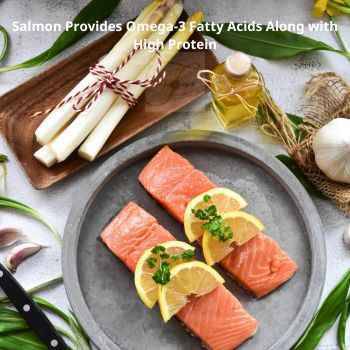
11. Edamame Is Young, Green Soybeans That Are High In Protein
Best high-protein foods and snacks
Edamame are young, green soybeans that are often harvested before they ripen or harden. They can be enjoyed boiled or steamed and are often sprinkled with a little salt, and served as high protein snacks or appetizers.
Not only is Edamame delicious, but they are also very nutritious as it is a good source of protein, fiber, vitamins, and minerals. These young soybeans are known for their slightly sweet and nutty flavor.
Edamame is a useful source of plant protein, and high-protein vegetables and is a great choice for vegetarians and vegans. Contributes significantly to muscle development, maximum support of immune function, and overall cellular health.
Edamame is a source of many different nutrients, including fiber, vitamins (like folate, vitamin K, and vitamin C), and minerals (like iron, magnesium, and potassium).
The high protein found in edamame is linked to potential cardiovascular benefits, including reduced cholesterol levels and improved overall heart health. In addition, Edamame also contains antioxidants, such as isoflavones, which help protect cells from damage caused by free radicals.
Good weight control comes from the fiber in edamame beans, which contributes to feelings of fullness, and can aid in weight control by reducing overall calorie intake. A good choice for high-protein meals for weight loss
Controls blood sugar levels, making it a good choice for people with diabetes or those who want to control blood sugar levels. Minerals such as calcium and magnesium found in young soybeans are important for maintaining bone health.
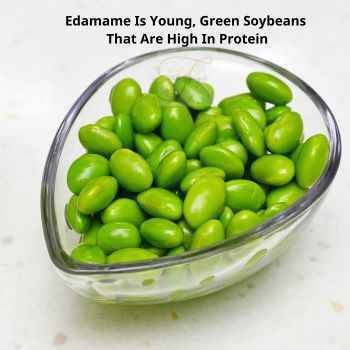
12. Quinoa Is A Complete Protein and Contains All Nine Essential Amino Acids
Best high-protein foods for weight loss
Quinoa is often referred to as a “complete protein” because it contains all 9 essential amino acids that the human body needs, which cannot be produced on its own. These essential amino acids are important for body functions such as building and repairing tissues and producing enzymes and hormones.
The status of high-protein nuts is very high because they provide a high protein that is especially notable since most plant-based protein sources lack one or more essential amino acids. This makes quinoa a great source of high-protein nutrition for vegetarians, vegans, and those looking to diversify their high-protein vegetarian meals.
In addition to being a complete high protein, quinoa also provides many other high nutrients such as fiber, vitamins, and minerals, making Quinoa a nutritious and versatile food. It is often used as a substitute for grains in various dishes and can be incorporated into salads, and soups or served as a high-protein snack.
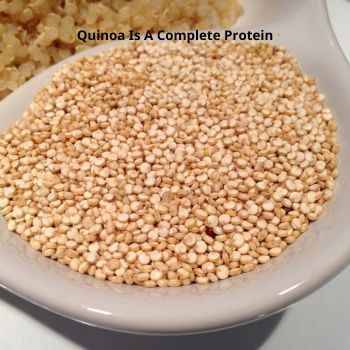
13. Eggs Are A Complete Source of Protein And Contain Essential Amino Acids
Non-meat high protein foods
Eggs are a complete source of high protein and contain all nine essential amino acids. These amino acids are important for various physiological processes such as protein synthesis and repair in the body.
Eggs are rich in high-quality protein, which helps build and repair tissues, produce enzymes and hormones, and support immune function. Eggs also contain other important nutrients such as vitamins (B and D), minerals such as iron and phosphorus, and antioxidants. In addition, the high protein in eggs has a high biological value, meaning it is well absorbed and used by the body.
It is important and important to note that although eggs are a nutritious food, it is the dietary balance that people with specific diets or health concerns should consult. by a healthcare professional or registered dietitian about the dietary balance that people with specific diets or health concerns should consult with a healthcare professional or registered dietitian to ensure their nutritional needs are met.
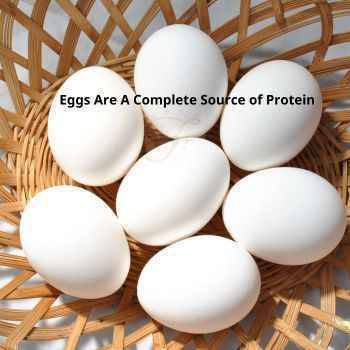
14. Higher Protein Than Regular Yogurt, Greek Yogurt Is Also Rich in Probiotics
Soft high protein foods
Greek yogurt is a high-protein yogurt product that is popular with everyone not only because it has a higher protein content than regular yogurt but is also rich in probiotics.
The high protein content of Greek yogurt is filtered to remove excess whey, creating a thicker and creamier product. This leads to a much higher protein concentration than other conventional yogurts. Thanks to its increased protein content, Greek yogurt is a top choice for those looking to increase their protein intake.
Greek yogurt contains Probiotics, which are beneficial bacteria that help promote a healthy balance of microorganisms in the intestines. Probiotics may contribute to digestive health and may have other potential health benefits. These live bacteria are naturally present in Greek yogurt.
Greek yogurt is rich in calcium and nutrients, which are essential for bone health. In addition, it also provides other important nutrients such as potassium, vitamin B12, and magnesium.
The versatility of Greek Yogurt in cooking is so versatile, that you can use it in a variety of high-protein recipes, both in sweet and savory dishes or high-protein desserts. Either as a healthier alternative in recipes calling for sour cream, mayonnaise, or ice cream or make high protein smoothies that deliver a creamy texture with added nutritional benefits.
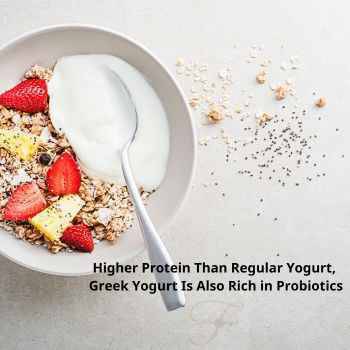
15. Lamb Is Indeed A Good Source of High-Quality Protein, It Is Rich in Essential Amino Acids
High protein meats
Lamb is a very good source of high protein, it is rich in essential amino acids, which the body needs for various functions, including building and repairing muscles.
Lamb is a high complete protein, and a good source of other nutrients such as iron, zinc, and B vitamins. However, you should note that lamb can also be relatively high in fat, so Recipe moderation is key, especially if you watch your fat intake. Incorporating lean meat and lamb as an important part of a balanced diet provides a delicious and nutritious source of high protein.
Including lamb in your diet helps contribute to meeting your protein and amino acid needs, which support your overall health and muscle function. Additionally, like any high-protein food, it is essential to consume lamb in moderation as part of a balanced diet.
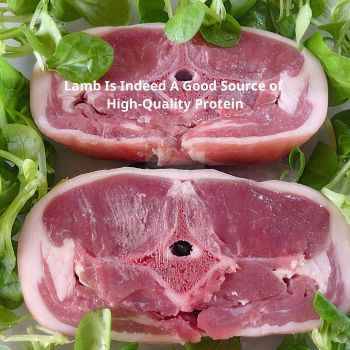
16. Green Vegetables And Mushrooms Are Some of The Most Popular Protein-Rich Foods Today
Cheap high-protein foods
Although green vegetables and mushrooms are protein foods and provide many health benefits, they are not generally considered good sources of high-protein foods compared to other foods such as meat, dairy, legumes, and legumes. certain types of cereals. However, they contribute to overall protein intake and provide other essential nutrients.
Vegetables such as spinach, broccoli, and kale are good sources of protein foods but in smaller amounts than other protein-rich foods. However, they are an excellent source of vitamins, minerals, fiber, and antioxidants.
Meanwhile, mushrooms have a relatively low protein content but are a good source of complete protein foods and other nutrients such as B vitamins, selenium, and antioxidants. They can be a valuable addition to a best protein foods diet.
To meet the body’s protein needs, we must know how to add many different protein sources to our diet. Options from the animal protein foods list such as meat, poultry, fish, eggs, and milk are complete proteins, meaning they contain all the essential amino acids. Plant-based options such as beans, tofu, tempeh, and some grains (quinoa, buckwheat) can also provide high protein, although they may lack some individual essential amino acids. odd.
If you’re following a vegetarian or vegan diet, it’s important to combine different plant-based protein sources to ensure you’re getting the full range of amino acids. Can help you create a balanced diet and high-protein vegetarian foods that meet your individual needs and preferences.
